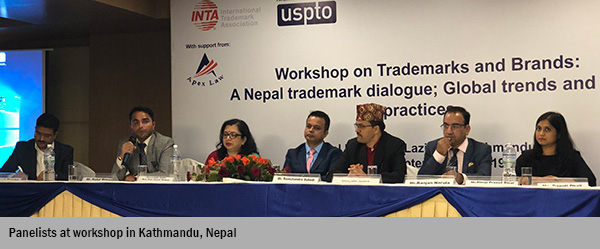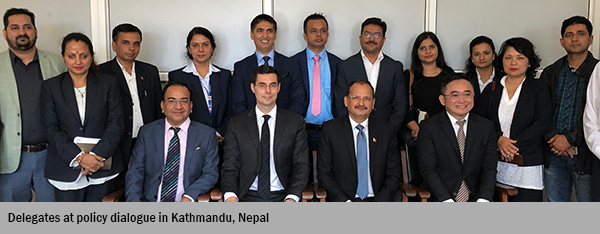INTA Leads High-Level Delegation to Nepal
Published: November 15, 2019
INTA representatives, including Board members, INTA staff, and brand-owner members, met with authorities in Kathmandu, Nepal, on September 30, to discuss forthcoming amendments to the Nepal trademark law. Following these discussions, INTA conducted a workshop with government and industry representatives.

Department of Industry Meeting
INTA met at the offices of the Nepal Department of Industry with the Department of Industry’s newly appointed Director General, Jiwan Prakash Sitaula, who provided details of the draft law. Director General Sitaula welcomed INTA’s support for training and future cooperation, especially with regard to examiner trainings, Madrid Protocol issues, enforcement matters, and well-known marks recognition.
INTA representatives raised a number of issues regarding the existing trademark regime in Nepal, which the Director General indicated would be covered in the new law. Issues addressed included the need to present a foreign registration certificate to apply for a mark as a foreign entity in Nepal, overly burdensome notarization and formalization procedures for applications, lack of multiclass applications, lengthy enforcement processes, and lack of timeliness in regards to cancellation matters.
Workshop and Policy Dialogue
At the conclusion of these talks, INTA conducted a workshop and policy dialogue for judges, government officials, university representatives, and bar association members on the subject of trademarks in the context of forthcoming trademark law amendments. The program, which drew more than 100 participants, was supported by the U.S. Patent and Trademark Office with the assistance of local INTA associate member Apex Law.
Ministry of Industry Commerce and Supplies Joint Secretary Dinesh Bhattarai discussed how the forthcoming legislative reforms would affect intellectual property (IP) in Nepal. Secretary Bhattarai noted that this legislation will include reforms in traditional areas of IP, but would also cover emerging issues, such as creating a separate IP department, traditional knowledge, collective marks, certification marks, geographical indications, plant varieties, copyrights, and patents (design and utility).
Chief Justice of the High Court Patan Nahakul Subedi delivered the workshop’s keynote address, highlighting the technological disruption and change that is occurring in Nepal. He explained that brands can help consumers make meaningful choices by brokering the conversation between entrepreneurs and consumers, while at the same time maintaining fair competition and protecting consumers.
Session One of the workshop focused on well-known marks from the standpoint of global industry. Rajiv Chauhan (Pernod Ricard South Asia, India) discussed the importance of well-known marks, noting the difficulty of registering brands across global jurisdictions. Mr. Chauhan pointed out that the utilization of systems such as the Madrid Protocol would allow for easier registration in many jurisdictions. INTA Famous and Well-Known Marks Committee, Middle East and Asia Subcommittee Chair Vikrant Rana (SS Rana & Co, India) outlined the history of well-known marks protection and explained the concept of spill-over effects in various classes and territories. Cross-border television and video content, he noted, are perfect examples of how consumers can become familiar with well-known marks, particularly when it comes to global sporting events that expose consumers to brands around the world.

Session Two focused on nontraditional marks, such as sound, 3D, and color marks, all of which will be addressed in the new law. The session was moderated by Ministry of Industry and Commerce Under Secretary Bimal Prasad Baral. Mr. Baral noted there are two separate categories of nontraditional marks: visual signs such as 3D and color marks; and nonvisual signs such as texture, smell, and sound marks. INTA Board Member Louis Chan (UL International – Singapore Private Limited, Singapore) reviewed the global advances in nontraditional trademarks, providing examples of nontraditional marks from various jurisdictions.
Session Three, which focused on combating infringement, was moderated by Anticounterfeiting Committee member Janak Bhandari (Global Law Associates, Nepal). Panelists included the Honorable Justice Tek Prasad Dhungana, the Honorable Justice Anju Upreti Dhakal, Ram Chandra Subedi (Apex Law, Nepal), Ranjan Narula (RNA IP, India), Rahul Bagga (Unilever, Nepal), and Deepti Dhall (Pepsico India Holdings Pvt. Ltd., India).
The Honorable Justice Anju Upreti Dhakal outlined the section of the current trademark law section that conflicts with the Paris Convention’s protection of unregistered trademarks. She noted that, although there may be some apparent conflicts, judges should undertake a balance of the laws by examining the underlying policy for the enactment of these laws.
The final session focused on how trademarks can support development and sustainable growth. Gourish Kharel (Kto, Inc., Nepal) remarked that IP plays an important role in economic development and noted that there are currently 83,000 applications at the Registry. She also pointed out the need to develop a system to assist in determining well-known marks.
Director of the South Asian Association for Regional Cooperation, Economic Department, Chanchal Chand Sarkar, noted that IP rights are protected by the World Trade Organization to promote trade. However, he pointed out that investment brings in foreign direct investment and has a strong impact on economic growth as well as gross domestic product, employment, and development-and IP rights make up only one factor in this equation. He noted that consistent and predictable economic environments help to foster business, and innovation leads to better technology and productivity.
Diana Rahman of the Asia International Arbitration Center concluded the session by emphasizing the role that mediation and arbitration play to reduce the social costs of IP litigation.
INTA looks forward to continuing work with Nepalese authorities as they implement the new law. INTA is building its activity in South Asia, and welcomes interested members to contact INTA India Consultant Gauri Kumar at [email protected] and Asia-Pacific Chief Representative Seth Hays at [email protected] for more information.
INTA’s 142nd Annual Meeting
April 25-29, 2020, in Singapore
Be at the center of it all when the global intellectual property community gathers to connect, learn, and stay up to date on the key trademark issues that are top of mind for all brand owners.
Find out more here.
INTA’s Asia-Pacific Representative Office, based in Singapore, represents the Association’s 789 members across the region. Working in collaboration with staff at INTA’s headquarters in New York City, the Asia-Pacific Representative Office leads the Association’s policy, membership, marketing, and communications initiatives throughout this region. To learn more about INTA’s activities in the Asia-Pacific, please contact INTA Chief Representative Officer Seth Hays at [email protected].
Although every effort has been made to verify the accuracy of items in the INTA Bulletin, readers are urged to check independently on matters of specific concern or interest.
© 2019 International Trademark Association
This website uses cookies so that we can provide you with the best user experience possible. Cookie information is stored in your browser and performs functions such as recognising you when you return to our website and helping our team to understand which sections of the website you find most interesting and useful.
To find out more please see our Cookies Policy and Privacy Policy.
These cookies are used to identify a user’s browser as the visitor goes from page to page on the Site. These are session cookies, which means that the cookie is deleted when you leave the Site. It is an integral piece of the Site software and used to let the server know which users are on the Site at any given time and make certain parts of the Site easier to use.
|
|
If you disable this cookie, we will not be able to save your preferences. This means that every time you visit this website you will need to enable or disable cookies again.
These cookies are used to collect information about how visitors use our Site. The cookies collect information in anonymous form, including the numbers of visitors to the Site, where visitors have come to the Site from, the pages they visited and how they have interacted with tools on the Site like search and embedded media players. We use the information to compile statistical reports of our users’ browsing patterns so that we can improve the Site.
|
|
Please enable Functionality Cookies first so that we can save your preferences!
These cookies are used to deliver advertising relevant to the interests of visitors to our Site. They are persistent, which means they will remain on your device after you leave the Site.
- Facebook (Ad Pixel)
- Google (Ad Pixel)
- LinkedIn (Ad Pixel)
- Quattro Anonymous
Please enable Functionality Cookies first so that we can save your preferences!
